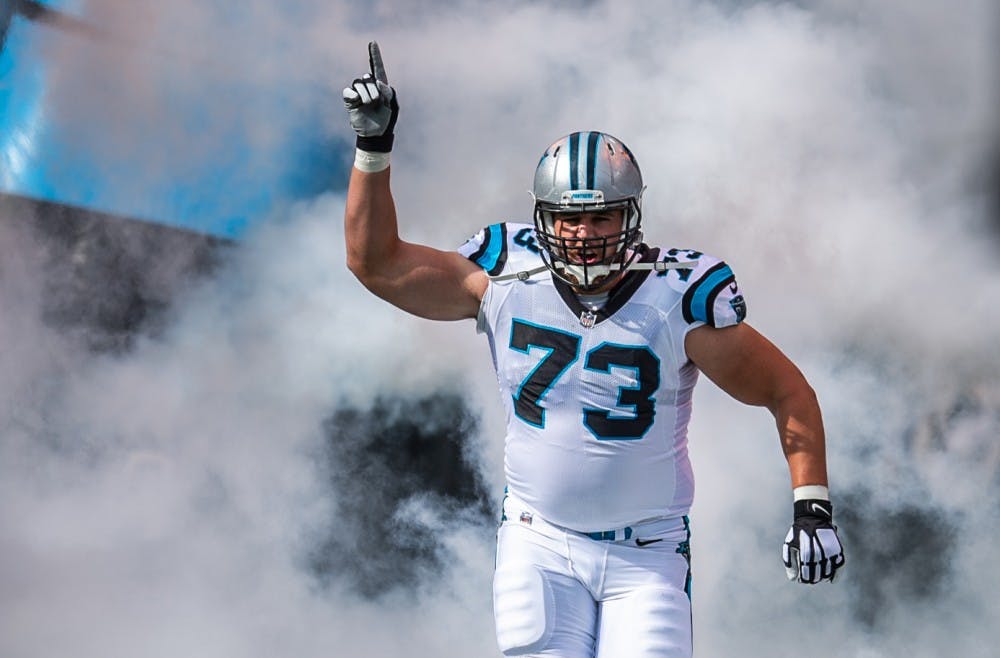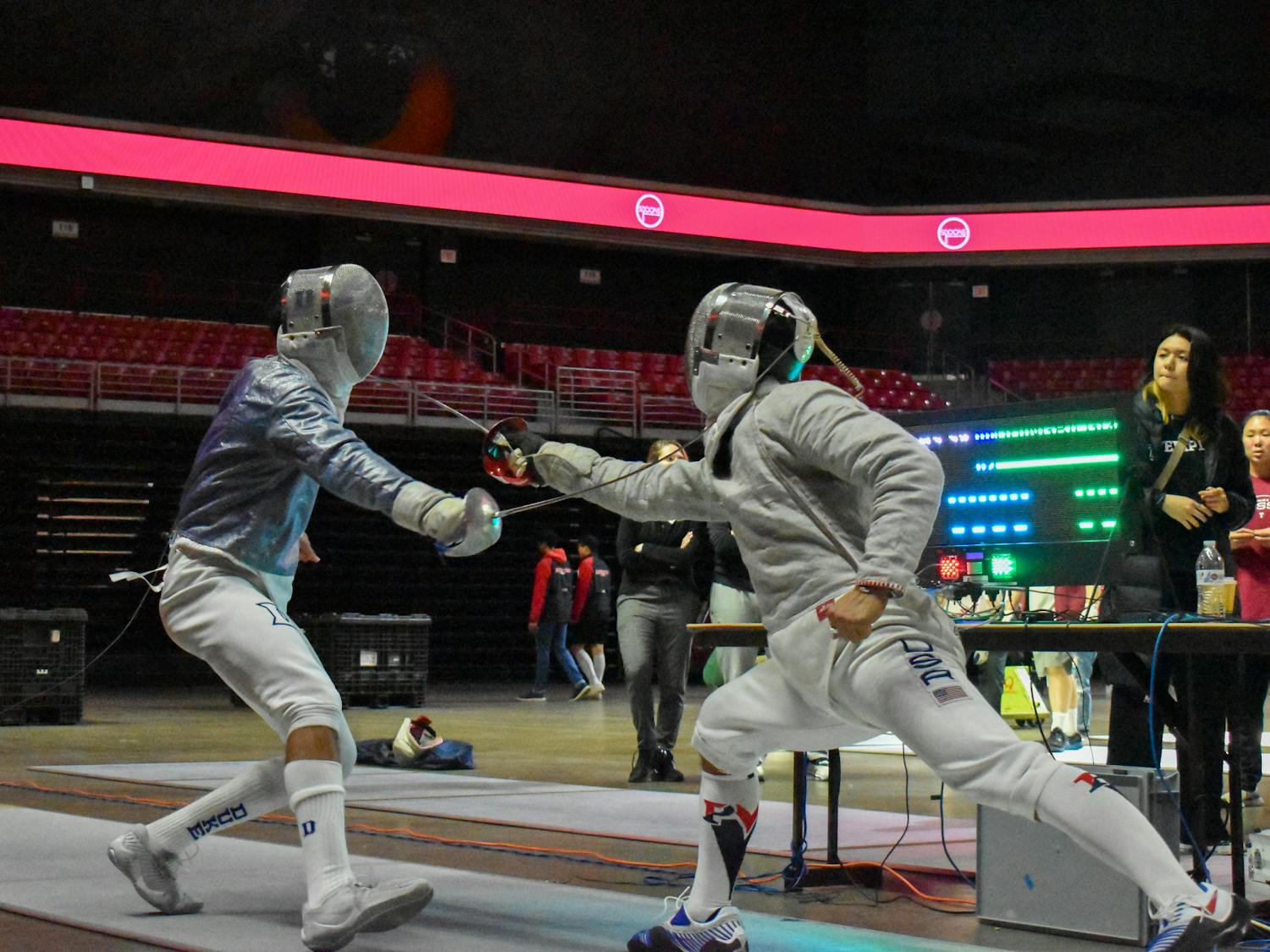With the culmination of the NFL season, The Daily Pennsylvanian recently caught up with Carolina Panthers' offensive guard and Penn alumnus Greg Van Roten about his football career since leaving Penn. Here's what the 2012 graduate had to say.
The Daily Pennsylvanian: You bounced around for a couple seasons before finally finding your footing in Carolina. Why do you think you were able to stick around in Carolina?
Greg Van Roten: It’s a combination of everything I had experienced in my career up to that point that allowed me to have the experience and awareness to make it work in Carolina. I came out of Penn in 2012 and was undrafted, and I spent my first two seasons in Green Bay and learned a lot. I learned from my mistakes, specifically. When I got injured, I didn’t handle it great mentally. In 2014, I didn’t stick around too long in Seattle, so I went up to Canada for a few years [to play in the CFL] and really learned how to be a professional. I got some confidence back and fell in love with the process of becoming a great player. I picked something to work on every day and focused on getting better. Then, I signed with Jacksonville, but things didn’t work out. I worked out for a few more teams before I finally landed in Carolina. They believed in me and gave me the opportunity; in training camp, I came in as a backup, and due to some injuries on the offensive line, there was an opportunity for me to start. It took a long time, but I kept growing and learning every year and that’s what helped me the most.
DP: This season you played every single offensive snap, and you were the only Panther to do so. How does this accomplishment make you feel?
GVR: I wasn’t actually aware of that until after the season. I knew that I didn’t come out, but I didn’t realize that I was the only guy to do it. It was something to be proud of, though. It speaks to all the work you do year-round. It’s a miracle not to get hurt, especially as an offensive lineman, and it’s a testament to my offseason work.
DP: From a player's perspective on the Panthers, what is it like to play with athletes like Cam Newton and Christian McCaffrey?
GVR: McCaffrey had a great season, and it’s exciting to block for someone like him and Cam. It’s cool to be a part of it. Even though the season didn’t end the way we wanted it to, we had a lot of pride in our offensive line in opening up holes for Christian or protecting Cam or whoever’s back there.
DP: What advantages do you think your Penn degree gives you in terms of the business side of the NFL?
RELATED:
Penn football's schedule for 2019 confirmed, featuring two new nonconference opponents
Kevin Morris hired as offensive coordinator and quarterbacks coach for Penn football
GVR: The biggest advantage a Penn degree afforded me was that it placed me around the best and the brightest academically, and being in that environment prepared me mentally for learning NFL playbooks. A degree from any Ivy League school really says that you’re intelligent enough to figure this stuff out. When the coaches hear where you went to school, they expect you to know things quicker than everybody else.

Melissa Melvin-Rodriguez/Panthers
DP: What was the most memorable moment of your Penn football career?
GVR: The first thing that comes to mind is a moment during my sophomore year. We were at Harvard, and our defense made a goal-line stand to win the game and clinch the Ivy League championship for us—it was our first championship in six years. It was my first year starting, and there’s a lot of pride in bringing a championship back to Penn. That group of guys that I played with are going to be lifelong friends. I think that the connections and bonds you make playing football are special, especially when you win a championship.
DP: What’s your most memorable non-football memory from your days at Penn?
GVR: I was actually a part of the recolonization of the Delta Tau Delta Omega chapter. I was also a part of the Student Athlete Advisory Committee where I was a liaison between coaches, the administration, and student-athletes. I also did a work-study all four years at the Penn Relays office. It was really cool to see what Franklin Field looks like when it’s packed. In 2010, I was there when the Jamaican 4-by-[100m] team with Usain Bolt had a record-breaking performance.
DP: What do you miss most about Penn?
GVR: The people. I’ve heard this from guys that have played in the NFL that are now retired, and I feel the same way about college. The campus is always there and it’s always cool to go back. But all the student body and the team is completely different. The place brings back a lot of memories. But I really miss being around the people that I played with, that I went to class with, that I lived with, and that I made memories with.
DP: Do you think that your success in the NFL is going to pave the way for other Ivy League football players?
GVR: Honestly, it helps a lot when guys stick on an NFL team. There was a big gap especially for Penn players before me that actually made it to the NFL. But now, you look around the League, and you’re seeing more Ivy League players than I can remember in recent history. It’s really exciting to play against those guys too. It’s a little bit of a rivalry, but it’s also good to have that connection with people.
DP: Do you have any idea what you want to do after your NFL career is over?
GVR: It’s definitely something I’ve been thinking about as I’ve been getting older. I’ve played longer than anybody anticipated I could, and my goal is to maximize my NFL career. That being said, there will definitely be a day where I need to transition. I’ve thought about going back to school and getting an MBA, starting a business, working for the League, or maybe the NFLPA.









